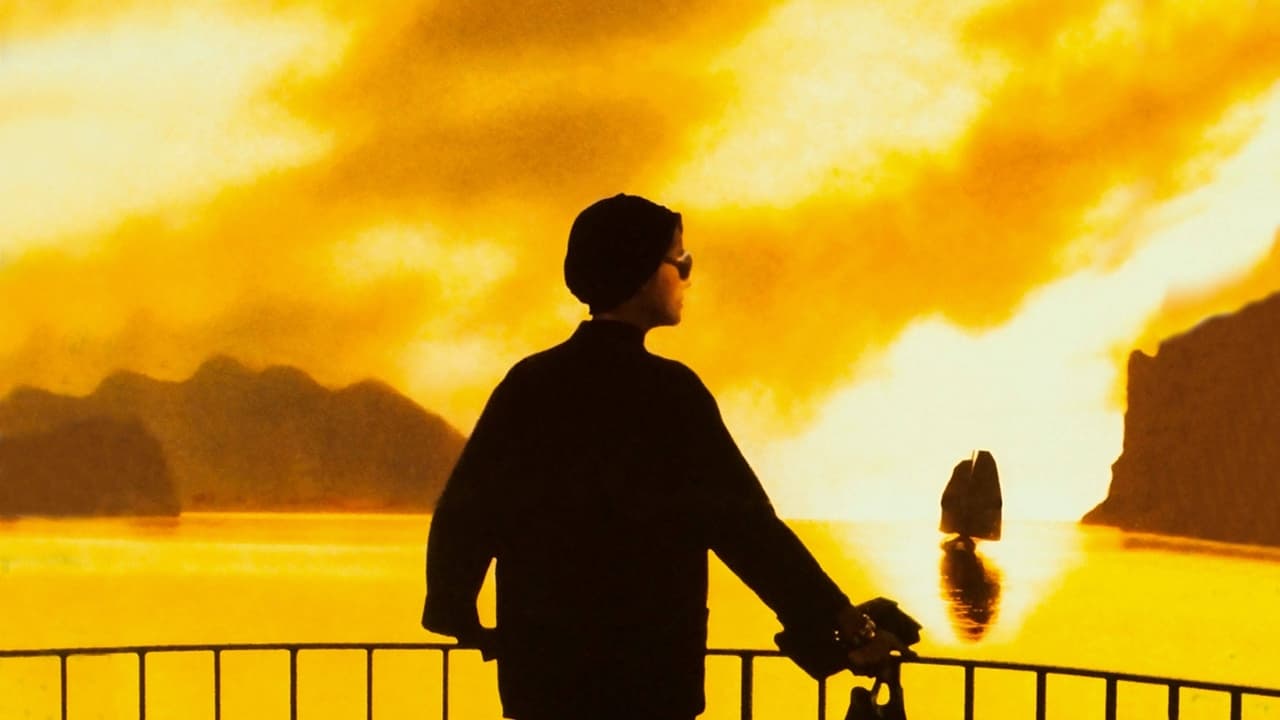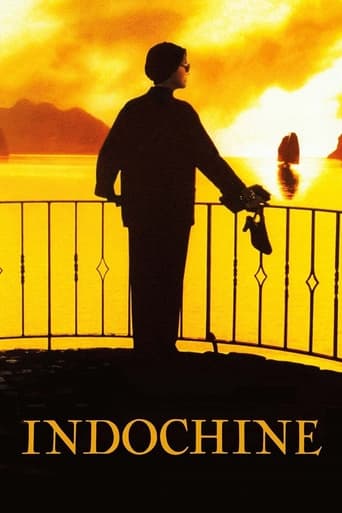

Indochine (1992) Colonial Indochina, the last 25 years. The 1930s. The struggle against European colonialism. French woman adopts Vietnamese girl. Rubber plantation owner with her father. powerful in a time when women usually were the opposite. Magnificent mountains. Spectacular cinematography. Opium. Painted faces in Vietnamese Opera. Cross-cultural love triangle. Between mother, adopted daughter, and forbidden French officer. Éliane, Camille, and Jean-Baptiste. Sides are chosen. Camille shoots a French officer for shooting a Vietnamese family. Jean-Baptiste protects her. Both are hidden with the locals, Communists. Secret River. Gorgeous long shots. They give birth to a son, Étienne. He is sent to live with his grandmother, Éliane. Jean-Baptiste murdered. Powerful scene when Camille is finally released from prison, five years later; Mother and daughter finally reunited, though both have changed dramatically. Especially daughter, who chooses to escape with the Communists to defend her country rather than meet her son. Éliane abandons everything, selling her plantation to Thanh's (young Communist originally engaged to Camille, in the end married her only to aid her escape to go find Jean-Baptiste) mother, moving to France. Fast forward to the present. We see that we have been watching what Éliane has been telling her adopted son, Étienne about his mother. They are on their way to Switzerland, where she is a Vietnamese Communist delegate at the 1954 Geneva Peace Conference. This is his opportunity to finally meet his mother. He instead waits in the lobby for her to recognize him. Of course, she does not. Having left and missed his chance, Étienne unsentimentally says that she, Éliane, is his real mother. Maybe a little long, but only slightly. More likely, pacing could be improved. Notable suspension of disbelief is necessary. Filmed on location in France, Malaysia, and Vietnam, the lush and gorgeous landscapes and overall cinematography. Engaging story. Wonderful music. Powerful performances, especially by matriarch Catherine Deneuve. Quite educational, not many films on Indochina out there, especially not before the Vietnam War. Minh Tam expresses, "I will never understand French love stories. They're all about madness, fury, suffering; similar to our war stories." Add "beauty" to that and you have a perfect film description. Gorgeous epic film, Choosing sides in love and war, French, Vietnamese. Haibun is a prosimetric (written partly in prose and partly in verse) poem in which most commonly one haiku is included after the prose, serving as a climax or epiphany to what came before. #Haibun #PoemReview
... View MoreThe always cool and elegant Catherine Deneuve plays a cool, elegant plantation owner in French Indochina swept up in changing times while pursuing a beautiful but cruel French naval officer. Things get complicated when the sailor elopes instead with Deneuve's innocent, adapted Vietnamese daughter, and the young lovers embark on a heroic journey across Southeast Asia: the girl is nearly sold into slavery; the Frenchman rescues her and they escape; a revolution breaks out; the couple is separated; a baby is born; so forth and so on.Needless to say the plot is packed with enough melodrama to fuel more than one TV miniseries, which proves to be a saving grace. On a purely emotional level the film is shallow but entertaining, not unlike a classy, subtitled soap opera, with over two full hours of grand passion, exotic scenery, and turbulent history. As Deneuve's native housekeeper says: "I'll never understand French people's love stories; they're nothing but folly, fury, and suffering." Which may well be the perfect endorsement for such an unlikely saga.
... View MoreSome of the INDOCHINE comments already posted are so powerful that I was hesitant to offer my own. I am not an authority on the art of cinema, preferring to experience films and then see what I think/feel about them. INDOCHINE is a profoundly beautiful and moving film. I watch it now and then to recalibrate my moral compass.Background: I believe that colonialism's fate was sealed with the invention of movable type. Granted, it seemed unstoppable for a few centuries, but all forms of Manifest Destiny, et. al, like all dogs, eventually have their day. So will those that are currently wallowing in "puerile, self-congratulatory nationalism," to borrow a phrase from Carl Sagan. Philosophically speaking, colonialism, like slavery, is indefensible. What's to like, unless you're the one doing it? True, there are films that celebrate the triumph of colonial powers over lesser beings. Here are three: THE FOUR FEATHERS, THE SAND PEBBLES, sort of, and GUNGA DIN, also sort of. GUNGA DIN, however, imputes more intelligence to the erudite Thugee leader, GURU, than the three loutish British noncoms who fight him to preserve the RAJ. The noble, water-carrying Gunga Din, a sort of human reincarnation of Rin-Tin-Tin, saves the day and gives his life for his beloved leaders. More than often, such films serve patriotic purposes. Whatever works, eh?INDOCHINE is a fine example of cinematic art with a strong message about social justice and the rights, under Natural Law, of all peoples. It is strikingly beautiful. But under all this beauty lay injustice, cruel exploitation and addiction to drugs and sexual appetites. One sees the rot and decay of the French and Mandarin ruling classes. Compared to them, the Communists didn't look half bad. For more on that subject, look up THE NEW CLASS, by Milovan Djilas, in Wikopedia if you don't want to read it.Just as France held fast to her colonies in Indochina like a parasite, colonist/rubber plantation owner Emile fastened on to his daughter, Elaine. In turn, she clung to her beautiful adopted daughter, Camille. The most striking metaphor was the Tango scene, in which mother and daughter danced a grotesque parody of romance. The young naval officer, Jean Baptiste, saw this very clearly. Confronting Elaine with this awful truth got him banished, his naval career in tatters (actually, it's not quite that simple). It also put in motion a tragic set of events that convulsed the lives of all concerned. The love between Camille and Jean Baptiste survived, living on through their infant son, Etienne, who was adopted and raised by Elaine. Every time I watch this remarkable film I feel emotionally drained. Time to watch something light and funny, eh?
... View MoreI was never aware of this film, perhaps because I was not of the appropriate age to appreciate, but I must say, about thirteen years after its theatrical release, I was quite pleased with it on every level. Not only were the locations appropriately beautiful, and the cinematography mature and relaxed, but the acting, casting, plot development, and dialogue were in beautiful harmony. The film was a fantastic lesson in history to which Vietnam and the rest of us are owed. To satisfy length requirements for my comments, I will add, that this crew did not shy away from showing characters who experience anger, insult, jealousy, pain and all the rest with true precision. It is nice to see fine acting and depth with appropriate casting. I recommend this film to anyone who wants to see color and who can read subtitles. I would also recommend that this film be viewed in two or three sittings. I did this because of disruptions, but actually, this respite added to the inherent suspense of each characters' fate and made the film easier to digest on a whole. Nonetheless, you will find, that the film flows and throws in excitement just where it is needed.
... View More